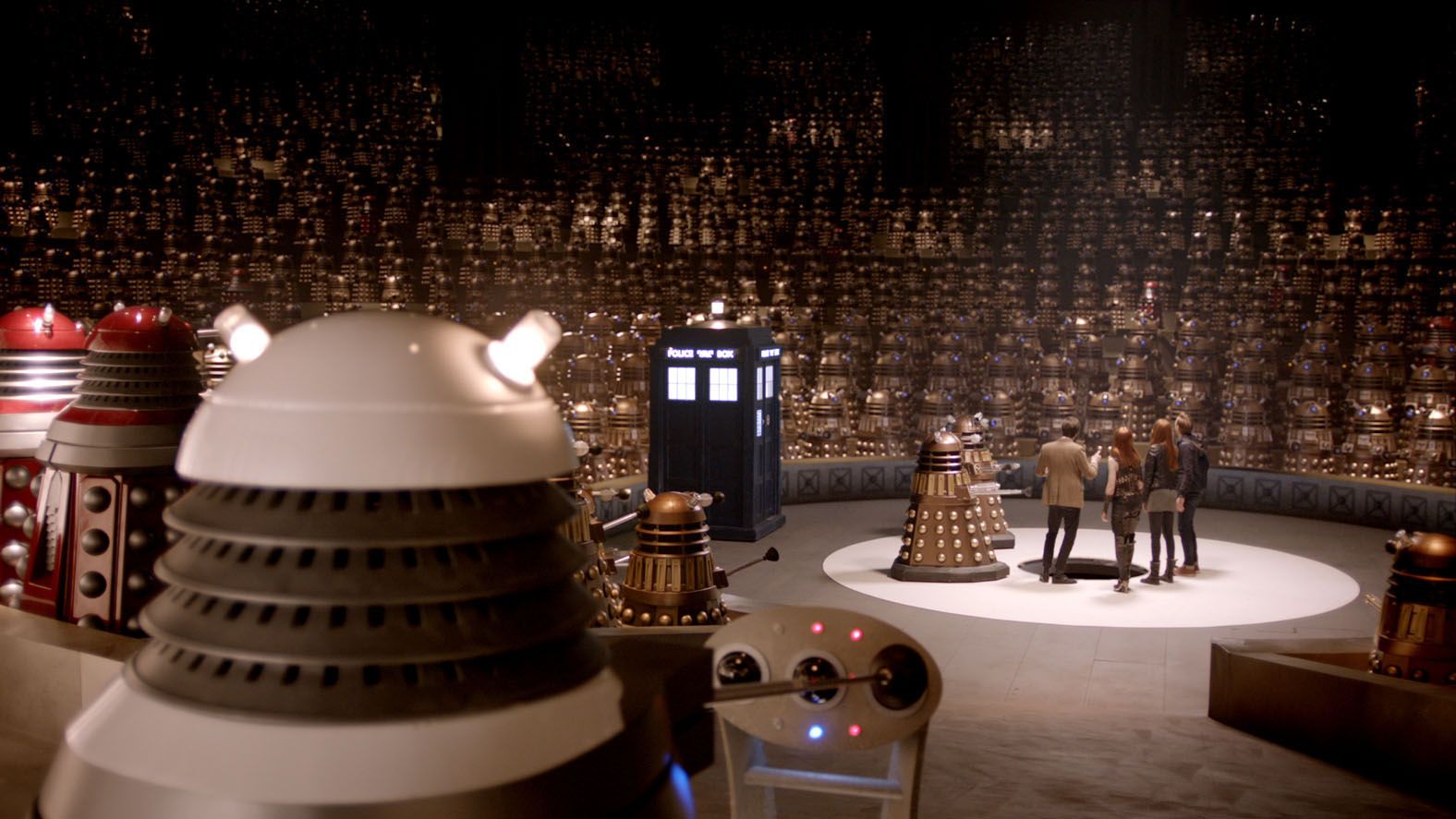Doctor Who: Asylum of the Daleks
Sunday, 2 September 2012 - Reviewed by Matt Hills

Doctor Who - Asylum of the Daleks
Written by Steven Moffat
Directed by Nick Hurran
Broadcast on BBC One - 1 September 2012
Has the internet melted yet? Because Asylum of the Daleks may well be the greatest piece of Moffatesque misdirection that Doctor Who has ever enjoyed. “Every Dalek ever!” screamed the advance publicity, promising scale and spectacle and scope. And sure enough, we got all that. But the hype was just a smoke screen set up to protect the real heart of this episode, and its audacious, incredible use of one unexpected character. Rarely has a series opener been as memorable and as history-defining as this, at least in terms of Doctor Who’s overarching mythos. We’ll not see Asylum’s like again: this is a one-shot trick, introducing an important human character only to then mount a stunning, gobsmacking reveal. Almost an inversion of Rob Shearman’s Dalek in places, this time the difference between human and monster is explored from the other side. “Remember me,” the Doctor is told, and I’ve no doubt he will, along with millions of fans.
Asylum of the Daleks is testament to the production team’s impressive ambition, and Moffat’s desire to find new things to do with the Daleks. There’s plenty of life left in the old icons yet, whether it’s the fact they now have a Prime Minister and a Parliament (were all the different Daleks referred to as a ‘Coalition’ in any earlier drafts, I wonder?), as well as an innovative and brilliantly visual way of commandeering puppet humans. The zombie sequence is surprisingly nasty for contemporary Who, veering sharply into horror territory despite its lack of blood and gore.
Along with ringing the changes, Moffat’s script appears to blatantly ignore plot points from ‘Victory of the Daleks’. Though he’d already expounded the view that the Dalek Paradigm were an “officer class” (something that hardly makes much sense of red “drones”), for series seven the showrunner goes right ahead and reinstates popular Davies-era bronze models. In DWM 451, Moffat argues that this “isn’t a continuity error”, and of course he’s right. It’s no error. It’s a deliberate, conscious continuity blanking or resetting after ‘Victory’; a discontinuity aimed at recharging and revitalizing the pepperpot psychopaths. Sometimes ignoring Who’s continuity can enable a brilliant story possibility, or facilitate startling TV spectacle, and Asylum surely provides ammunition for that viewpoint.
After last year, I wasn’t at all surprised that Nick Hurran was allocated to a number of Moffat scripts. I can imagine Moffat watching a cut of The Girl Who Waited and muttering to himself “I’m having some of that!” (although my imagination is fairly warped, I’ll concede). And Hurran plus Daleks doesn’t disappoint; a number of sequences are incredibly tense. In directorial terms, everything just works, as the episode rockets along towards its devastating conclusion with plenty of visual panache.
There’s also some crafty word play – another hallmark of a gold-standard Moffat screenplay. Childhood jokes or mispronounciations of eggs-term-in-ate won't ever be seen in quite the same light after this. And there’s a characteristic mash-up of prior Moffat motifs (he really does seem to love writing a strange, transformative kind of quasi-fan fiction based on appropriating his own previous scripts). On this occasion, it’s back to ‘The Empty Child’/’The Doctor Dances’ for a nano-cloud, Skarosian remix of the nanogenes, mixed with an aspect of 'Let's Kill Hitler'. But on the all-round strength of this showing, if Moffat's ‘new’ ideas amount to shiny rearrangements of old ideas, then so be it.
Weak spots? I’m not sure there are very many, although with so much to cram in, Amy and Rory’s storyline seems curiously rushed, condensed to its essential plot beats. And Moffat’s “feisty” female characters all seem to speak in the same quickfire, gimmicky manner which grates ever so slightly to my ears. Whatever faults one might have attributed to Russell T. Davies’s series openers, he always sketched out convincing characters incredibly well. Even minor figures could take on a dense weight of realism. By contrast, many of Moffat’s characters carry an air of stylized unreality, something which I’d say has been true of Amy Pond in the past, and seems true yet again of the major new character here, thanks partly to things like the “chinboy” and “beaky” shtick.
Akin to ‘The Impossible Astronaut’ last year, this episode helps set up a host of questions, as well as cleverly integrating the “Doctor Who?” business into its events. Forget series five’s partial misfire, because Steven Moffat already has. This episode is the real 'Victory', thanks both to its Dalek depictions and its unprecedented contributions to Who's history. Did you think you’d ever see an introduction quite like this? Unexpected, unpredictable, and utterly, utterly brilliant. You can tick “Daleks” off the list; when is Steven Moffat going to write a proper, full-on Cyberman story?











